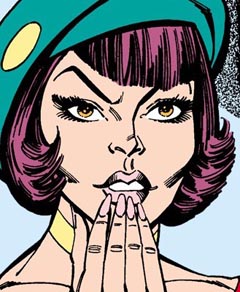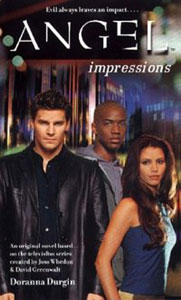Doranna Durgin did solid work on her short stories in “Tales of the Slayer, Vol. 1” and “Angel: The Longest Night,” but she trips up when making the leap to a full-length novel with “Angel: Impressions” (February 2003). Tuingas demons from a pocket dimension accidentally lose a deathstone in Los Angeles, and the stone gives off emanations that make the local demons go berserk. For no good reason, it takes nearly 300 pages for the Tuingas to reclaim it. In the meantime, the gang fights crazed LA demons and Angel struggles to keep Angelus at bay.
The lack of a plot would be OK if there was compelling character stuff, but “Impressions,” set very early in Season 3, doesn’t offer much of that, either. Angel fighting his inner demons is nothing new, it’s a hard thing to capture in prose, and it has been done better elsewhere.
Gunn trains a group of teens as a neighborhood watch against demons, something that has potential, but it doesn’t make sense. Gunn’s old gang should be training these youngsters. It’s never explained why they aren’t, and why they don’t take umbrage at Gunn doing it. Or show appreciation for it. The point is, they should have an opinion.
Also, a faux Angel has opened up a detective agency and is undercutting Angel Investigations’ business and hurting its reputation, since this skinny guy, named David (not to be confused with Nabbit), is pretty bad at his job. This concept has potential, but it goes exactly where you think: The guy is shamed into realizing he’s no Angel. In an example of how Durgin’s grasp of the Angelverse is shaky, the gang wonders how David heard about Angel in order to imitate him. But Angel Investigations is a functioning business, not a secret enterprise, so of course people know Angel exists if they move in these circles.
The author is caught on the idea that Gunn is highly suspicious of Angel, but I thought the gang had mended their fences with the Pylea adventure at the end of Season 2. Throw in his random and secret training of the street teens, and his lack of a sense of humor, and Gunn seems out of character. Wesley is less competent than he should be. The edgy, angry Angel is in character inasmuch as he’s being bombarded by deathstone emanations the whole book. The same goes for the unusually surly Lorne.
Fred is the most on point, lurking around the Hyperion Hotel. In a nod to the upcoming “Fredless” (3.5), Cordy suggests Fred write things down to calm her active mind, and Fred says she is doing that, but doesn’t spell out that she’s writing on her room’s walls.
Cordelia is in character, but she’s suffering from a ton of visions, the health repercussions of which the TV show will eventually address, but it’s not clear why this case is leading the Powers That Be to pepper her mind. Maybe it ties in with the deathstone, but as much as “Impressions” is overwritten, the reason for uber-visions isn’t solved.

The Tuingas demons – they of the rogue deathstone – are well-designed, featuring two noses. I remember the humorous notion of a “doublesneeze” from my first reading. However, they don’t have anything to do except wring their hands over how they haven’t yet gathered up the problematic deathstone. Once they do, the novel will end.
The final showdown is set in a zoo, which could be fun, except there are none of the animals-vs.-demons battles you might expect. And the way the gang works the mission is off-point. You’d think they’d access the zoo by breaking through an unguarded portion of the barrier. For some reason, they decide they need to get in through the front gate, so they place their hopes in finding a discarded invitation by a patron attending the evening’s fundraiser. That’s certainly the sketchiest plan AI has ever devised. Ultimately, Wesley uses subterfuge to get a tram driver to bring them in, which makes more sense.
Nitpicks aside, “Impressions’ ” big fault is that the plot advances at a snail’s pace. We know early on what needs to happen and it takes the length of a novel to get to that point. This could’ve been a decent 50-page short story. The prose is not hard to read. I see Durgin has another “Angel” book coming up soon in the queue, and I hope she devises a more complex plot for that one.
Click here for an index of all of John’s “Buffy” and “Angel” reviews.

